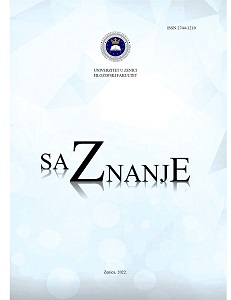SJEĆANJE NA DRUGOG JE SJEĆANJE NA SEBE ILI BEZUSLOVNI OPROST
REMEMBERING ANOTHER IS SELF-REMEMBERING OR UNCONDITIONAL FORGIVENESS
Author(s): Bernard HarbašSubject(s): Cultural Anthropology / Ethnology, Sociology of Culture, Politics of History/Memory, Politics and Identity
Published by: Filozofski fakultet, Univerzitet u Zenici
Keywords: remembrance; memory; forgiveness; mourning; friend;
Summary/Abstract: Practice of remembering is important for those cultures which experienced major crimes, and, in that respect, it serves not only for us to remember events, but also to preserve the identity of the community which was the victim. Through this practice, victims are being instrumentalized for the purpose of preserving and strengthening the identity of the community. Communities which maintain institutionalized remembering of crimes committed against them have religious and ethnic character. Victims of criminal expeditions, like homosexuals or kulaks, do not have organized remembrance and their identity and sacrifice are thus irrelevant for state politics. Culture of remembrance creates sacralization of the victim and thus only crimes committed against the nation that experienced them are emphasized, whereas the others become less important. Remembrance is egoistic because it appropriates the person we mourn and remember, since we transform him into the speech. By using the pronouns “I” and “we” in necrologies and commemorations, we selfishly appropriate the one we remember and, so to say, kill him once again. Culture of remembrance must be interrupted through the practice of forgiveness. Such forgiveness should be unconditional and the one that asks nothing in return. It must be extraordinary because, with it, we must forgive what cannot and must not be forgiven, like the greatest crime.
Journal: saZnanje
- Issue Year: 3/2022
- Issue No: 3
- Page Range: 439-445
- Page Count: 7
- Language: Bosnian

